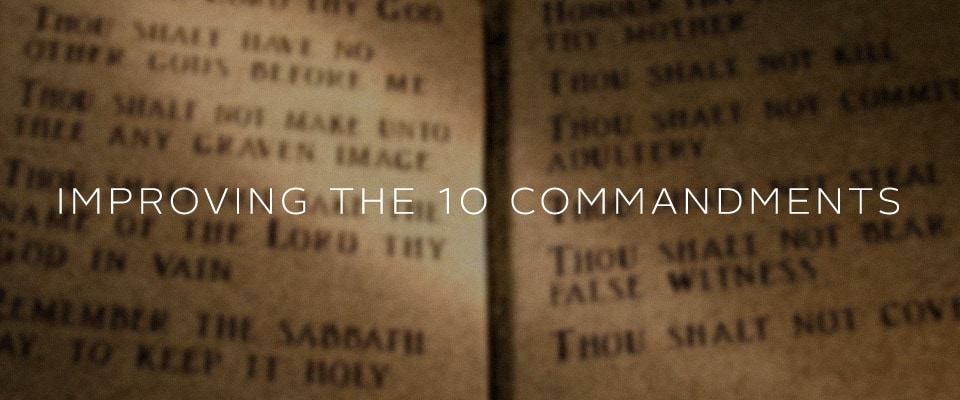Western culture has begun to not only promote the idea that we no longer need God, but that we can actually one-up God. Popular philosopher and neuroscientist Sam Harris said in an interview, “Consider the possibility of improving the 10 commandments. This may seem like setting the bar kind of high, because this is the only part of the Bible where God felt the need to physically write himself … The truth is, almost any precept would improve the wisdom of the Bible. How about: don’t mistreat children, don’t pretend to know things you do not know, or what about try not to deep fry all of your food.” This quote follows the sentiment of his book, Letter to a Christian Nation, where he points out superior ethical commands in other religions. In short, Harris thinks the 10 Commandments are not so great, they can easily be improved upon. They are too simple.
Now, Sam is a funny lad. But don’t let his humour get the best of you. It’s one thing to abandon God, but another to say that you can improve upon supposed God-inspired commandments (… even if we agree that we should deep fry less Twinkies!). Now to Harris’ credit, the 10 Commandments are very simple. They are not complicated at all. They almost seem too simple, but are they? A few simple questions resolves this issue.
First, has anyone ever actually kept these commandments?
I don’t think anyone can say ‘yes’ with integrity. Perhaps this is why the commandments are oh-so-very simple. God didn’t write what we would consider to be a magnum opus of ethical instruction because he knew that the very basics would be beyond our grasp.
Harris takes issue with the fact that the first four commandments put God at the center of ethics. So, let’s put the first four commandments, which are about God, aside for a moment. Even if we ignore the vertical focus and look to the horizontal focus about our interactions with others, we can’t make it through the week without someone dishonouring their parents, murdering, committing adultery, stealing, lying, or coveting.
You may want to dress these ethical directions up in fancier clothing, such as “don’t mistreat children” or “don’t pretend to know things you’d don’t”, but at the root these sort of actions could only flow out of keeping the basic six horizontal commandments.
But perhaps some noble soul out there claims to abide by these very simple commandments, and insists that they can be improved upon. Then we need to look at them a bit closer, which leads to my next question:
Second, has anyone ever kept these commandments as Jesus views them?
In the Sermon On The Mount, Jesus quotes a commandment and then says “But I say to you.” While from the outside looking in, it may appear like he is improving upon the commandments themselves, rather he is getting to the heart of the command by addressing how they were to be used.
Let’s look at two examples from Jesus’ teaching:
“You have heard that it was said to those of old, ‘You shall not murder; and whoever murders will be liable to judgment.’ But I say to you that everyone who is angry with his brother will be liable to judgment; whoever insults his brother will be liable to the council; and whoever says, ‘You fool!’ will be liable to the hell of fire.” (Matthew 5:21-22)
“You have heard that it was said, ‘You shall not commit adultery.’ But I say to you that everyone who looks at a woman with lustful intent has already committed adultery with her in his heart.” (Matthew 5:27-28)
While a lot could be said about what Jesus is doing here, what is clear is that he doesn’t think the commandments are insufficient. He thinks that our use of them is deficient. We want to take them too literally rather than applying them to our hearts. A commandment not to murder addresses feeling anger towards someone, or insulting another, or calling someone names. If this is true, it certainly addresses “don’t mistreat treat children.” Isn’t it fair to say that the commandment not to lie addresses “don’t pretend to know things you don’t”?
We don’t need better commandments, we need a better use of them. When this happens, what becomes clear is that nobody, absolutely nobody, can claim to live up to this very simple moral code through the lens that Jesus shows us. Jesus is revealing how God always intended the commandments to be used.
While Harris may want to beautify the commandments and dress them up in modern language and concerns, whatever clothes he may put them in doesn’t address the fact that humanity needs commandments and that humanity fails to live up to them. If humanity was as good as modern society likes to propose, we would need no laws, no jails, no judicial system. We wouldn’t need any commandments at all. But we do. And while we may be able to participate in societal behaviour modification, adjusting how we act will never change our festering hearts. Jesus knows this. He says later in the gospel of Matthew that “what comes out of the mouth proceeds from the heart, and this defiles a person. For out of the heart come evil thoughts, murder, adultery, sexual immorality, theft, false witness, slander. These are what defile a person.” (Matthew 15:18-20).
No commandment can change our hearts, it can only expose them. This is why the first four of the ten commandments are vertical. Unless our relationship with God is addressed, there is no way to keep the horizontal commandments. And, of course, we can’t keep the first four commandments either. We need a mediator, we need reconciliation between us and God to happen, because we have failed miserably to keep his commandments.
Finally, if we improve our use of the commandments they will drive us to plead for mercy, for grace, and to not only appreciate but to rejoice over Jesus keeping the commandments for us. Paul writes “By sending his own Son in the likeness of sinful flesh and for sin, he condemned sin in the flesh, in order that the righteous requirement of the law might be fulfilled in us, who walk not according to the flesh but according to the Spirit” (Romans 8:3-4).
The only way we become deeply ethical people is through the only truly ethical person who ever lived. It is only through faith in Jesus and a life lived in the Spirit that our hearts can begin to be transformed by God into the sort of people Sam Harris thinks we can attain on our own. Only through Jesus do we begin to live out the spirit of the commandments, because He has already done it for us, and offers to live in and through us.




